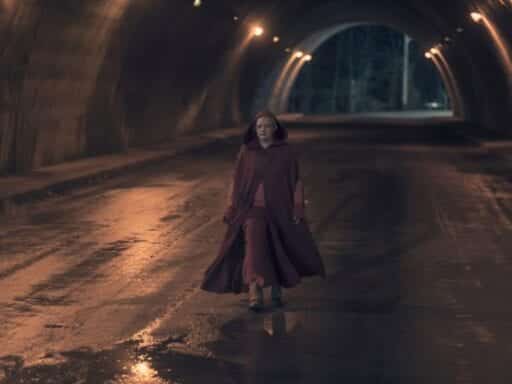The show tempts fate by having one character make a decision that could completely blow up in the series’ face.
Every week, a few members of the Vox Culture team gather to talk out the latest episode of The Handmaid’s Tale, Hulu’s adaptation of Margaret Atwood’s 1985 novel. This week, critic at large Todd VanDerWerff and staff writer Constance Grady discuss “The Word,” the finale of the second season.
Todd VanDerWerff: Why does June stay in Gilead?
The most obvious answer — or, rather, the most proximate answer — is that she’s staying to try to find and rescue Hannah, which is a more or less understandable motivation, but doesn’t get you past the, “How does June survive five minutes?” problem. You can also see the show planting the seeds of her more actively joining the anti-Gilead resistance in these final 15 minutes, with her meeting both a Twilight Barking of Marthas and Bradley Whitford cosplaying as O’Brien from Nineteen Eighty-Four. You could even argue she’s — sigh — staying for Nick.
And the season even prepared us for this, structurally, with June’s three escapes ending in three subtly different ways that slowly showed us her building to a place where she would choose to stay in Gilead, rather than making a run for it. (Namely, she gradually regains her agency across the three attempts, being captured after the first, choosing to be captured in the name of saving Holly in the second, and finally choosing to stay of her own volition in the last.)
I think all of these are defensible explanations, and they’re all the sort of thing season three might make great stories out of. (Okay, not the Nick thing.) But none of them get past the fact that the only reason June isn’t killed or sent to the Colonies after seeming to kidnap a baby (that baby being the whole reason for Gilead’s existence, mind) is because she’s the protagonist. And that’s a dangerous position to leave your show in on a cliffhanger — asking the audience to have faith that you have a solution to this beyond, “Well, if she’s not alive, then there’s no story, right?”
I hate to gripe about this, because for the most part “The Word” does some interesting things in closing off the story of the first two seasons of the show. And if, in some future world, we realize that the series began its pivot to being about the resistance, or about Emily’s adventures in Canada, or about Bradley Whitford’s cantankerous relationship with everybody, well, maybe we’ll look on it more kindly. But right now, because we can see so little — and because the cliffhanger mirrors season one’s just a little bit — it’s hard not to be a little frustrated.
But at least some of that frustration stems from my niggling fear that the series might just drop June right back into the Waterford household, when the second half of season two essentially argued that whole arrangement was completely untenable. Indeed, at this point, the Waterford house is just a whole bunch of people who hate the Commander and then the Commander himself, who has all of the power, yes, but wants most desperately to be liked. (You get three guesses as to which modern political figure that resembles.)
Anyway, I had been spoiled on this happening — thanks to an ill-timed visit to the Handmaid’s Tale’s writers’ room and another critic who watched this episode before me filling me in on the details — so I ended up finding it more nuanced than the version in my head had been. As someone who presumably had no idea what was coming, what did you think, Constance? And what did you think about everything in the episode that wasn’t its last minute?
Why The Handmaid’s Tale shouldn’t be a superhero show
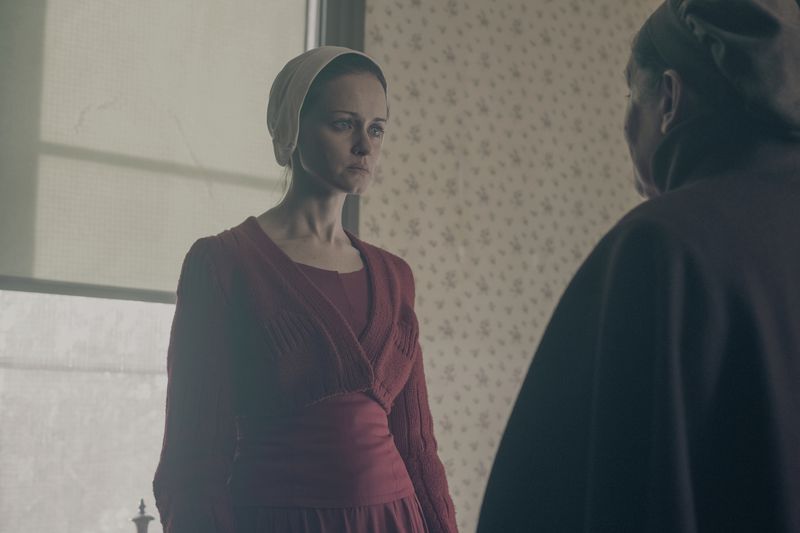 Hulu
HuluConstance: I had absolutely no warning about the ending, and, uh … I kind of hate it.
Look, I’m a human being with a pulse. Am I down for a TV show where Elisabeth Moss plays a feminist vigilante superhero who takes down a bunch of rapists? Of course I am. Do I want that show to be The Handmaid’s Tale? Emphatically not.
It’s the superhero angle that really gets me, I think. That final shot of June flicking up her red Handmaid’s hood, stone-faced, and then disappearing into the mist: that’s a superhero move, no doubt about it. It belongs to the kind of show you described above, Todd, where June can just kinda mosey around in a field, I guess, and survive without us having to worry about her getting picked up by the Eye.
It’s a world where you know that the hero is going to survive for no better reason than that they’re the main character and so things are just going to work out that way, a world that is a power fantasy and a cathartic escape from reality, a world that is what you wish your own world could be, where all trauma is just a badass origin story.
There’s nothing wrong with that kind of story — I like a lot of stories like that! — but it’s not exactly built to work as a political allegory or an examination of rape culture or of how totalitarianism affects the human psyche, and those are the things that Handmaid’s Tale has previously shown itself to be really, really good at. At this point, I don’t see how a vigilante June plotline is going to lend itself to those ideas.
Of course, there is still Serena Joy to contend with. This week was constructed to bring home to her that she is not so special as to be the sole and perfect exception from Gilead’s misogyny, which seems to have been her position at the beginning of the Gilead takeover, but which has become an idea that is increasingly difficult for her to stand behind. When she stands before the Council and reads from the Bible, she expects that at best she’ll convince them to allow women to read again, and at worst she’ll get a slap on the wrist. Instead, she gets her finger cut off.
That’s what prompts Serena to release baby Holly/Nicole to June at the end of the episode — but do you think it also signifies an irreparable rupture in her marriage with Fred, Todd? Also, did this week make it canon that Bradley Whitford is the one who’s choosing all of this show’s needle drops?
Todd: I absolutely believe that this episode confirms Bradley Whitford is The Handmaid’s Tale’s music supervisor, and I like it enough to just retroactively erase all of my complaining about the music cues in the past. (Emily sitting, terrified, in the back seat of his car, listening to a blaring “Walking on Broken Glass” was all of us, really — both unsure why this obvious song choice was happening and reassured that even in a dystopia, the Sirius/XM ’80s on 8 station continues to exist.)
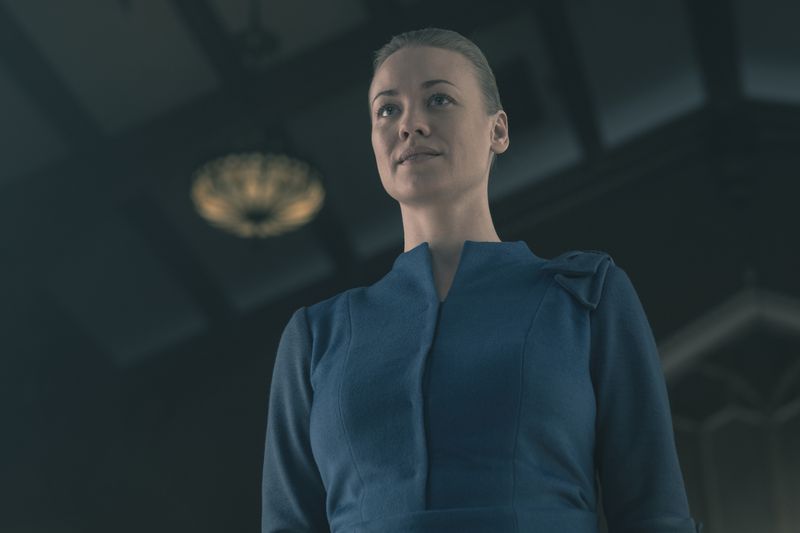 Hulu
HuluI’m less sure about the Waterford marriage. Serena Joy was season two’s most vital and interesting character, an often brilliant examination of a woman suddenly forced to reckon with her own complicity. Contrary to the criticism I’ve seen of the show turning her into someone “sympathetic,” I’ve been fascinated by how often the series has portrayed her as one of our modern proto-fascists right alongside suggesting she has feelings. It’s like the series is saying, “Yes, all people have feelings, but some of them are also trying to dissolve democracy.”
This is one of the reasons the relationship that grew between June and Serena made sense. They could be allies in some circumstances, but ones few and far between and always pointed toward the sheer fact that both of them were in the same oppression boat. And the show was always clear that only one of them was instrumental in building that oppression boat. But it’s also a big part of the reason the dissolution of the Waterford marriage has mostly worked, even though it’s largely played out in the background of the season. That fight the two had at the abandoned house in “Holly” is the sort of thing that would prompt a visit to couple’s counseling, but lol at Gilead having couple’s counseling.
So I think what I’m saying is I buy all of the individual pieces of what Serena Joy does — from giving up the baby to June to reading from the Bible to being furious with Fred — while also not being entirely sure they belong in the same episode of television. They could have used room to breathe, I think, and they’re instead clumsily jostling against each other here.
The same goes for everything from Emily stabbing, then pushing Aunt Lydia down some stairs (?!) to June’s final choice — I buy all of them in isolation; I don’t quite buy them as part of the same piece of television. It feels for all the world like the show realized this was its finale somewhere in the middle of post-production and hastily cobbled something together.
That’s not true, obviously, but it would be a good explanation for why that final shot exists. I agree with you that it’s pretty much the reason the whole “June stays” cliffhanger plays out in a far more… confrontational fashion than I think the show may have intended, to the degree that it really does reframe the story as one of an avenging angel or something similar. Without it, the cliffhanger plays as more of a mystery, or a reminder of how much June loves Hannah and doesn’t want her to be all alone in Gilead without either parent, or whatever. With it, it plays as the show abruptly shifting genres entirely.
I differ from you slightly in that I think it’s probably necessary for the show to pivot to being about the resistance if it’s going to run beyond this season. But, like you, I don’t know that I want June to just suddenly be a vital part of said resistance. One of the things about June that makes her difficult to translate to television is that she’s ultimately a point-of-view character, whose actions rarely impact the story much. She can nudge what happens around the edges, but that’s about it. (She has this in common with, of all fictional characters, Harry Potter.)
So if June is joining the resistance as part of the show’s increased interest in world-building — great, fine, wonderful. Let’s see that world through her eyes and build it up slowly but surely. But if she’s suddenly, like, Elizabeth Jennings from The Americans, it’s not gonna work. It feels weird to have this little faith in the show after its mostly made good choices over these two seasons, but this is a weird one.
That said: I do want to talk about world-building a bit. From those maps on the Commander’s desk to the sudden realization that the Marthas have a whisper network, “The Word” did a solid job of expanding the amount of information we have about Gilead, just as much of this second season has done. But that, too, might be a betrayal of the source material, which takes place in an information blackout, of sorts. What do you think?
Where all of this might be heading in season 3
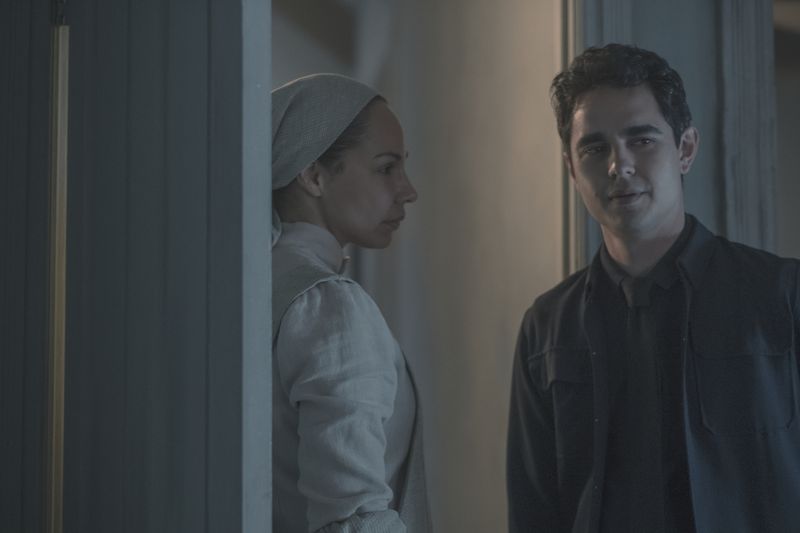 Hulu
HuluConstance: I can be protective of Atwood’s novel, but deepening the world-building is the kind of adaptation change that doesn’t bother me: I don’t see how it would be sustainable for a serialized TV show to continue without building out that cloistered world a little bit. In the book, all we know of Gilead is what Offred can see of it from between the wings of her bonnet, but there’s no way a TV show could run on those little snippets of information.
Bringing Emily to Canada is a plot choice that I can see going either way. My hope is that now that Emily and Moira and Luke are all in Canada, the show will begin to figure out how to integrate their storylines into the central story of Gilead. We began to see strides in that direction in episode nine, but the Waterfords can’t go on diplomatic missions to Canada every week, so they’ll have to work out some other kind of long-term solution. And Moira, especially, has felt like an afterthought this season, which is just a profound waste of Samira Wiley.
But Emily’s become such a volatile character that she’d be a bit of a chaos monster wherever she is, whether that’s in Gilead to murder random officials and then kick their corpses (unlike like you, I loved Emily stabbing Aunt Lydia in the back and then shoving her down the stairs. It was just so cathartic! If June must become a superhero, at least give me this), or in Canada to, presumably, finally feel the full impact of her PTSD and have a nervous breakdown. And that is something that I am excited to see.
Speaking of cathartic moments: Fred had what passes for a rough week for him, what with June slapping him and telling him to go fuck himself before she runs off with Nicole, and Serena refusing to look him in the eye after he has her dragged off to be maimed. Fred tends to be at his most dangerous and unstable when he feels powerless, so do you think that he’ll spiral out violently next season? Or will the kidnapping of his child following his wife’s public rebellion mean that he’ll lose so much status among the Commanders as to be effectively neutered?
Todd: The thing about Fred is that you can flatter him into a lot of things by treating him like a strong man of great moral character. Even when he knows you know that’s not true, he’s happy to just be treated like he thinks he deserves. And yet it’s clear that his power is already starting to slip, at least within his own house, so who knows how much longer he’ll keep up the facade. (Hopefully long enough to look at more maps. I love maps.)
That’s the thing about this finale: If it’s setting up a version of the show that’s shifting into a new direction entirely (perhaps toward a depiction of the “Middle Gilead” period teased in the book’s epilogue), then it’s a pretty good one. If it’s just a way to hit the reset button, then it establishes a dangerous pattern for a show that has probably exhausted its status quo.
I entered this season wondering whether the show would be Mad Men — which used its second season to vastly expand its world and supporting cast to gird itself for a long run — or Homeland (which got caught in plot machinations designed to keep its premise going). And, uh, after this finale, I still don’t know! I like both Mad Men and Homeland, so I’d be okay with Handmaid’s turning into either. But I like one a whole lot more.
It’s weird to look at season three of a show I’ve really loved for 23 episodes as a proving ground, but that’s where I’m at. If the show spins wildly out of control, well, I really loved these first two seasons. And if it doesn’t, all the better.
I’ll have a piece publishing a little later containing my thoughts on season two as a whole, so let me know what you think, Constance. I think you agree with me that the show has written itself into a place where it can no longer be business as usual — but do you agree the journey there was mostly filled with strong television?
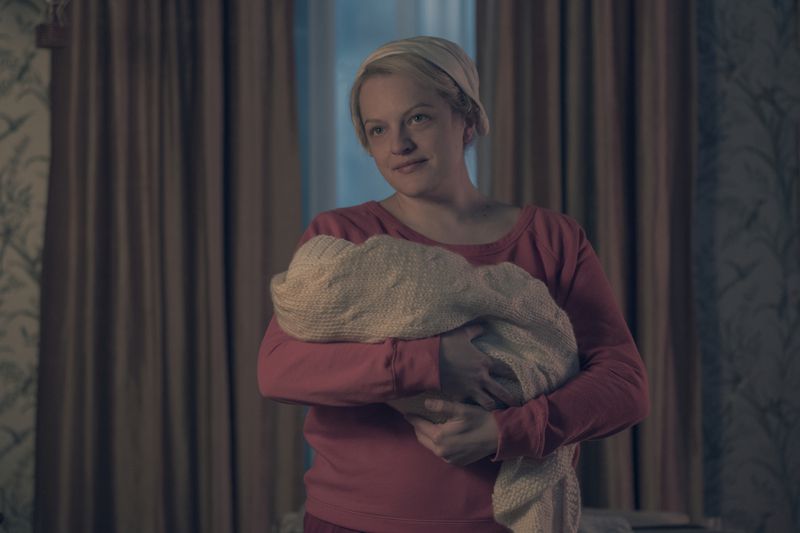 Hulu
HuluConstance: By and large, yes, I think this journey has been mostly pretty strong, and honestly season two has been by some measures stronger than season one. For me, nothing in season two of this show reached the heights of the stark, searing bleakness of the first three episodes of season one — but overall, this season is a lot smoother and more consistent. It found a sustainable aesthetic and it doubled down on it, so that from week to week Handmaid’s Tale has been as harrowing and as moving as anything else on television. (And also, at times, clumsy and hokey.)
It’s absolutely clear that the show had to make some major changes to the status quo to keep going; there was no way we could withstand another season of June periodically trying to escape and then getting dragged back to the Waterford house. But these last few episodes have sort of felt like the show trying on new clothes as it figures out how it wants season three to feel: Could Handmaid’s Tale work as a wilderness survival story, with wolves and rifles? What about as a camped-up piece of gothic horror? How about a superhero show? And I have yet to be convinced that any of those modes is a good fit for this show, especially compared to the creeping, austerely sinister domestic horror it established this season.
So I’m skeptical of the way forward, but I’m also looking forward to seeing exactly how things play out in season three. I want to see Serena keep spiraling and become more and more disillusioned with Gilead; I want to see Fred continue to lose power and status and get backed into a corner; I want see Nick … okay, no, to be honest, I don’t care what happens to Nick now that Eden’s dead, sorry. (Did you know that there are active Nick/June shippers on Tumblr who reblog shippy Nick/June gifs? I wish them joy with their harmless hobby, but I must admit that I am deeply puzzled by their existence.)
But most of all, I’m looking forward to seeing what Elisabeth Moss does with June next season. Elisabeth Moss can always find such incredible notes and shadings in her performance that this show would be worth watching even if everything else were terrible. I want to see what she does with season three.
Even if she’s playing a fucking superhero.
Read More
https://cdn.vox-cdn.com/community_logos/52517/voxv.png
